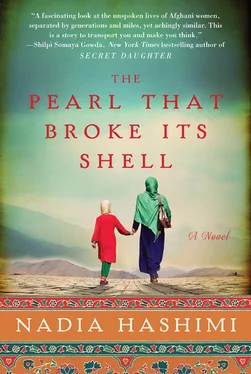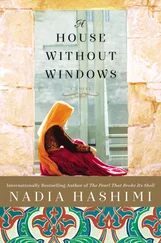Things fell apart at home, just as they did across the country when Russia left. While the Afghan warriors turned their guns and rockets on each other, Padar- jan tried to settle into life at home. He tried to work alongside his father as a carpenter but a man who had been taught only to destroy found it hard to create. Loud sounds jarred him. He grew frustrated and drifted back to the warlord, Abdul Khaliq, he had fought under.
Warlords were Afghanistan’s new aristocracy. Allegiance to a man with local clout meant a better life. It meant an income when there otherwise would be none. It wasn’t long before Padar- jan had oiled his machine gun, slung it over his shoulder and gone off to fight again, this time in Abdul Khaliq’s name. He returned home every so often. When he returned the first time and found that Madar- jan had given birth to yet another girl, me, he walked out again and returned to the killing fields with fresh anger.
Madar- jan was left behind with a houseful of girls and only her bitter in-laws to turn to. We lived in a small two-room house, part of the family’s compound. War pushed families together. Two of my uncles were killed in the fighting. My uncle’s wife died giving birth to her sixth child. Until he could remarry two months later, his children were cared for by my mother and my other aunts. We should have felt like one big family. We should have been kind to each other. But there was resentment. There was anger. There was jealousy. There was, as there would be in the rest of the country, civil war.
Madar- jan ’s family lived a few kilometers away, but they might as well have been on the other side of the Hindu Kush mountains. They had given their daughter to Padar- jan and did not want to interfere in her relationship with her new family. Madar jan ’s deformed sister, Shaima, was the exception.
Deformities were not easily forgiven, so Khala Shaima steeled herself to resist the name-calling, the ridiculing, the gawking. Older than Madar- jan by nearly ten years, our aunt would tell us things that no one else would say. She would tell us about the war, how the warlords controlled everything and conquered without mercy, even attacking women in the most shameful way of all. Usually Madar- jan hushed her older sister with a pleading look. We were young, after all, and it wasn’t Khala Shaima who would have to quiet our night terrors. Sometimes Khala Shaima forgot we were children and told us so much that we sat wide-eyed, frightened of our own father.
When Padar- jan came home, we cowered. His moods ranged from jubilant to foul but there was no predicting where on the spectrum he would be or when he would make an appearance. Madar- jan was lonely and welcomed her sister’s visits, even if her mother-in-law griped about them. My grandmother made sure to report to her son just how many times Khala Shaima had come to visit while he was away, clucking her tongue in disapproval and inciting his wrath. It was her way of showing Madar- jan that she was in control of our home, even if it sat fifty feet away from the main house.
Everyone wanted control but it was hard to get. The only one who seemed to have any was Abdul Khaliq Khan, the warlord. He and his militia were able to gain control of our town and the neighboring towns, having pushed back their rivals. We were north of Kabul and hadn’t seen any fighting in about four years but from what we heard, Kabul was besieged. People in our town shook their heads in dismay at the news but our homes were already pockmarked and turned to rubble. It was time for the privileged in Kabul to taste what we had survived.
Those were ugly times. I can only imagine what my father must have seen from the time he was just a teenage boy. Like so many others, he numbed himself to the ugliness with the “medicine” that Madar- jan referred to. He clouded his mind with the opium that Abdul Khaliq kept around, as crucial to his men’s ability to wage war as the ammunition strapped to their backs.
Madar- jan grew weary of our father but all she could do was look after us girls. Khala Shaima brought her some concoction that she took so she wouldn’t have any more children after me. I don’t know what the medicine was, but it worked for six years. When Madar- jan felt her belly stretch again, she prayed and prayed and did all the things that Khala Shaima told her to do. Nothing worked. Disappointed and fearful, she named our youngest sister Sitara and dreaded the day that Padar- jan would come home to find out she had brought yet another daughter into his home.
Then came the Taliban. They were just another faction in the civil war but they gained in strength and their regime crept across the country. It didn’t affect us much until we were pulled out of school, windows were blackened and music was banned. Madar- jan sighed but carried on, her daily routine largely unaffected by the new codes.
When word got out that our town had fallen to the Taliban, Abdul Khaliq brought his men home to fight back — and to defend his honor as a warlord. There were weeks of explosions, crying, burying, and then the men came home, victorious. Our town was again our own.
Padar- jan stayed home for a few months. He spent time with his brothers, tried to help his father recover some business and even helped some of the neighbors to rebuild their homes. Things were going well until the day that a young boy came knocking on our door with a message for Padar- jan . The next morning, Padar- jan oiled his machine gun, donned his pakol hat and headed back out to rejoin the war.
He came back here and there but his mood swings were worse with each visit. We saw him only two or three days at a time and we were children, too young to understand the rage he brought home. He was not the same person at all. Even Bibi- jan, my grandmother, would cry after his visits, saying she had lost another son to the war.
It was my cousin Siddiq who told us about the news. He had heard from our grandfather.
“Amrika. That’s who. They came and they’re bombing the Taliban. They have the biggest guns, the biggest rockets! And their soldiers are so strong!”
“Why didn’t Amrika come before?” Shahla had asked. She was nearly twelve years old then. Wise enough to come up with questions that made us look at her with admiration.
Siddiq was ten but had the confidence of a boy twice his age. His father had been killed years ago and he grew up under our grandfather’s wing. He was the man of his house.
“Because the Taliban bombed Amrika. Now they’re angry and they’re bombing them back.”
Our grandfather entered the courtyard and overheard our conversation.
“Siddiq- jan, what are you telling your cousins?”
“I was just telling them about Amrika, Boba- jan . That they’re firing rockets at the Taliban!”
“Padar- jan, ” Shahla asked timidly, “did the Taliban destroy many homes in Amrika?”
“No, bachem . Someone attacked a building in Amrika. Now they are angry and they’ve come after him and his people.”
“Just one building?”
“Yes.”
We were silent. It sounded like good news. A big, powerful country had come to our rescue! Our people had an ally in the war against the Taliban!
But Boba- jan could see in Shahla’s eyes that there was something that puzzled her and he knew just what it was. Why would Amrika be so upset after just one building was attacked? Half our country had crumbled under the Taliban. We were all thinking the same thing.
If only Amrika would have been upset about that too.
Читать дальше












